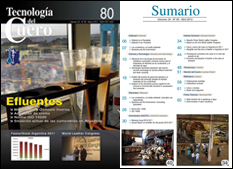Editorial
Editorial nº 80
Leather Technology Magazine

|
Editorial
The members of the leather value chain worldwide have recognized during the last two years, the strong need to work together to restore the industry lead role which was affected by different circumstances: the global economic crisis, the environmental issues (in some cases well-deserved) that consider the leather industry as one of the most polluting industrial activity, the appearance of leather substitutes which are advancing and penetrating the market badly named as “ecological leather” and so on.
In November 2011, at the end of the First Leather Congress held in Rio, Brazil the presidents of three major organizations signed a Memorandum of Understanding. The organizations were: International Council of Tanners (ICT), International Union of Leather Technologists and Chemists Societies and the International Council of hides,
skins and Leather Traders Associations (ICHSLTA).
In this document, whose original was already translated into Spanish and published on AAQTIC website, it was agreed to contribute with the greatest possible efforts, in
order to improve the identity of leather and the international leather and tanning industry’s image as a means of sustainable development.
It was also decided to develop an inclusive work strategy linking all members of the leather value chain.
The representatives of the aforementioned organizations, met again in Istanbul, Turkey, during the Leather Fair, held between 17 and 19 January, 2012.
During this last meeting, participants defined the guidelines of the joint work plan and how to face major projects for the leather industry.
Among them, is mentioned as a priority the one called “identity of leather”, comprising a first stage to collect and share national, regional and international rules and regulations concerning definitions, identification, marking and labelling of leather, as well as the international certifications required for skins, leather and products made of
leather.
The next meeting will be held on March 30, 2012, immediately after the APLF to be held in Hong Kong.
In my dual role as AAQTIC President and IULTCS Vice President, I believe that in our country and regionally as members of FLAQTIC, we must actively join this collective movement that promotes the strengthening and development of leather in the market as a valuable and irreplaceable component.
One of the priorities the Executive Committee of AAQTIC has set during 2012 will be the dissemination and training on issues related to environmental management and regulations in force regarding the contents of restricted and /or prohibited substances in leather.
We invite members, protecting members, advertisers in Leather Technology, Chambers, colleagues and organizations and institutions to which we send our magazine, to let us know your concerns and needs in training areas as well as proposals to work in teams, in Argentina and Latin America to strengthen the network of the global leather industry.
Lic. Patricia Casey - Presidente
Tanneries and the environment
For several decades so far in our country, both cities and
industries have become aware of environment-related problems.
As a result, several actions have been taken, using
a myriad of criteria but having different results, however.
Tanneries handle large volumes of water and generate
solid waste. Therefore, they had to analyze the need to
install effluent treatment plants and engage in waste management
and process analysis in order to minimize the
volume of waste.
In addition, certain restrictions were imposed on the location
of tanneries with regard to municipal and sector
plans.
Some 20 or 30 years ago, a number of Argentine tanneries
had their own treatment plants, some bought lands to
move out of the big cities, while others embarked in joint
ventures and plans.
On the other hand, large tanneries with equally large
treatment plants started to be installed at distant locations
from one another.
In recent years, the key issue is the sanitation of the socalled “Riachuelo”, a matter of significant legal actions.
Several tanneries installed large-sized facilities along the
Riachuelo bank.
The profile of the current situation of the sector, the cities
and the other industries is heterogeneous.
AAQTIC held several activities on these topics. A
Round Table was held at AAQTIC’s head office in the
1980’s, which gathered together technicians from tanneries
with their own effluent treatment plants, institutes
(CITEC) and representatives from joint ventures, among
others. A symposium on environmental issues was held
in 1994, which attracted a great number of attendees and
papers. A Round tables have been organized in Conferences
and Symposia on topics such as “Tanning in the 21st
Century”, “Management of solid waste” and “Cyanide
in Effluents”. The discussions of these round tables have
been included in articles and published in our magazine.
AAQTIC has recently held a course on effluent
treatment and a presentation. This issue contains information
about these activities.
This issue also contains a paper on membrane application
and reverse osmosis, presented in the 2009 China
IULTCS Congress and a paper on bibliographic review of
chrome adsorption methods in effluents.
Another paper authored by our President deals with the
implementation of ISO 14000.
Last, a new modality is incorporated: “Consulting specialists”.
In this first consultation, several technicians are
asked about the problems faced by tanneries with effluent
treatment and waste management facilities and about the
steps to be taken by the tanneries without these facilities.
On the one hand, we wish to include further papers and
presentation on effluents and environmental topics and,
on the other, we hope to continue making these “consultations” to specialists of other technical fields to publish
articles in our forthcoming issues.
Claudio Salvador - Director |



